Small Spoons: Essential Tools for Spice Mastery

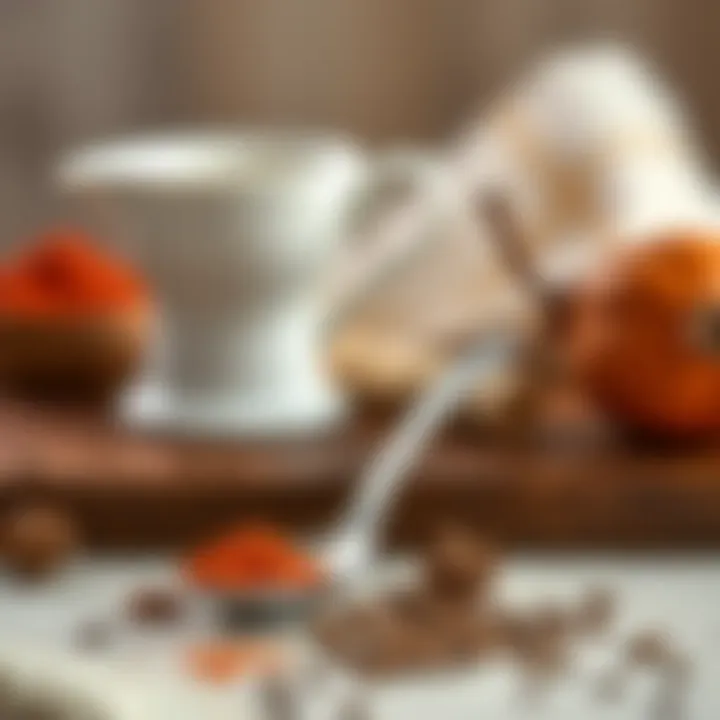
Intro
In the vast realm of culinary arts, the importance of precision cannot be overstated. Just as a craftsman needs the right tools, so too does a chef require the proper instruments to create culinary masterpieces. One such tool that often gets overlooked is the small spoon, specifically designed for measuring spices. These tiny utensils might seem trivial, but their role extends well beyond mere functionality. Each scoop of spice can transform a dish and elevate the overall cooking experience.
This article explores the multifaceted significance of small spoons in the kitchen. We'll take a closer look at their design, materials, and practical applications. In doing so, we aim to uncover not just their utilitarian value but also their aesthetic appeal in home cooking and presentation. With a polished understanding, both seasoned cooks and aspiring chefs alike can appreciate the impact that such an intimate tool can have on their culinary adventures.
Functionality and Versatility
Small spoons serve various functions that every home cook should be aware of. Their primary purpose is measuring spices with precision, which is crucial for maintaining balance in flavors. Different spices require different quantities; a delicate pinch of saffron makes quite a difference when compared to a hearty dash of cumin. Small spoons allow for that fine-tuning, ensuring the right kick in dishes from all corners of the globe.
Moreover, their versatility extends beyond just spices. Small spoons can also be employed to taste sauces, scoop herbs, or even serve condiments like mustard and ketchup at the dinner table, making them indispensable in both preparation and serving.
Materials Matter
When it comes to small spoons for spices, the materials used can significantly affect both function and aesthetic. Here are some common options:
- Stainless Steel: Durable and easy to clean, stainless steel spoons provide a modern look and don’t react with acidic ingredients.
- Wood: Wooden spoons offer a rustic charm, absorbing flavors over time and sometimes becoming almost heirloom-quality utensils with use.
- Ceramic: These spoons often have intricate designs, adding a splash of color to your spice collection while being easy to match with kitchen decor.
- Silicone: Flexible and non-stick, silicone spoons are great for scraping the last bits of spice from containers and are dishwasher safe.
Each material brings its unique characteristics, allowing chefs to tailor their choice based on personal style and practical needs.
Aesthetic Appeal
Beyond their functional roles, small spoons can also serve as decorative elements in the kitchen. A well-set spice rack adorned with beautiful small spoons can make the whole kitchen feel more inviting. Consider adding a few uniquely designed spoons to your collection to showcase on floating shelves or in jars. This can create an engaging visual dialogue within the space, fostering a feeling of warmth and culinary passion.
When viewed through the lens of aesthetics, it becomes clear that while small spoons serve practical purposes, they also contribute to the artistry of cooking and presentation.
"The small spoon may be tiny, but its heart is grand."
Enhancing the Cooking Experience
Integrating small spoons into your culinary endeavors can bring about a more enjoyable cooking experience. The act of measuring spices can be transformed from a mundane task into a moment of mindfulness as one engages thoughtfully with each ingredient. Recognizing the role of spices can deepen appreciation for the craft overall.
As homeowners and culinary enthusiasts explore the world of spices, small spoons can bridge the gap between precision and creativity. They are not merely an accessory but rather, a companion in the kitchen, aiding in exploration and nurturing an adventurous cooking spirit.
For further reading, check out resources such as Wikipedia, Britannica, or Reddit to explore more about culinary tools.
Understanding Small Spoons
Small spoons, often underestimated in the grand culinary scheme, hold a pivotal role in the art of cooking. This article will highlight how these diminutive tools are essential in the accurate measurement of spices, contributing significantly to flavor development and culinary precision. While they may seem like minor players in the kitchen, their influence on recipes and presentations is powerful and far-reaching.
Definition and Purpose
Small spoons are utensils designed specifically for measuring and serving small amounts of ingredients, primarily spices. These spoons serve two main purposes: precision in measuring and enhancing the overall cooking experience. They come in various sizes and shapes, accommodating different culinary tasks. For instance, using a small spoon for spices ensures that cooks can control the intensity of flavors in their dishes, preventing overwhelming taste profiles or unbalanced dishes.
It's crucial to note that accurate measurements with small spoons can separate a good dish from an exceptional one. When spices are added in the correct amounts, their flavors can blossom harmoniously, leading to a well-rounded meal that delights the palate.
Historical Perspective
The journey of small spoons, especially in spice measurement, is woven into the historical fabric of human civilization. Historically, different cultures utilized various small spoons for dishing out spices as cooking evolved. Ancient Egyptians crafted wooden spoons, while in China, jade and silver offered not just functionality but also status. These early implementations were based on tradition and practicality, representing the passing of culinary knowledge through generations.
Throughout the centuries, small spoons have adapted, reflecting cultural shifts and advancements in cooking technologies. For example, metal spoons became common in Europe during the Renaissance, showcasing both art and utility. They portrayed the intersection of craftsmanship and function, bridging the gap between a modest utensil and a work of art relevant to dining and cultural presentations.
The significance of small spoons has persisted across societies, highlighting their enduring role in food preparation and enjoyment. In various culinary traditions around the globe, they symbolize precision, care, and even reverence for food, emphasizing their importance not just as tools but as instruments of connection in the culinary arts.
"Cooking is an artistry of precision, where small spoons play a defining role in achieving balanced flavors."
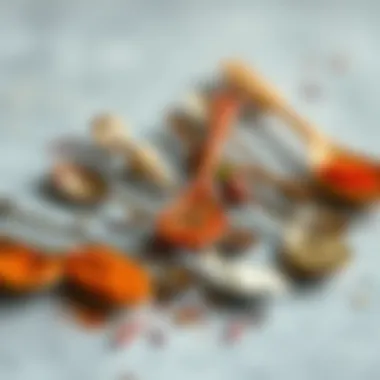
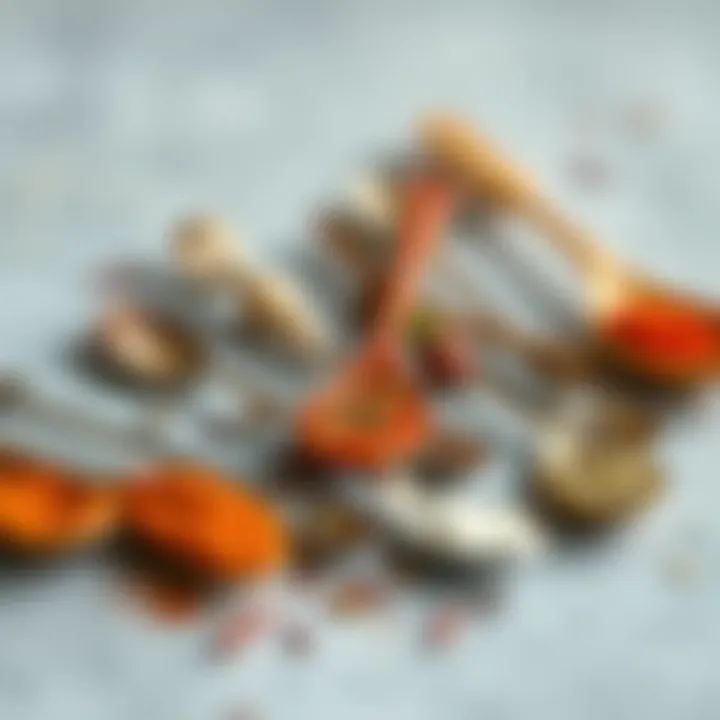
By understanding the multifaceted roles of small spoons, we see their relevance extend beyond mere function. They are integral to the cooking process, echoing traditions while facilitating modern culinary creativity. As we delve deeper into this guide, we shall explore various aspects of small spoons and their undeniable importance in the diverse world of culinary arts.
Design Variations of Small Spoons
The design variations of small spoons play a crucial role in the culinary landscape. Each variation is tailored to specific tasks, enhancing both functionality and user experience in the kitchen. Understanding these differences can guide culinary enthusiasts in selecting the perfect spoon for their needs, whether for precise measurements or aesthetic presentation.
Material Choices
Wooden Spoons
Wooden spoons are celebrated for their warmth and durability. Their ability to withstand high temperatures makes them ideal when stirring hot mixtures, especially in the context of spice blends. The key characteristic of wooden spoons is their non-reactive nature, which means they won't alter the flavor of spices. This is particularly beneficial for delicate spices, where the integrity of their flavor profile matters. One unique feature is their natural insulation, which provides a comfortable grip, making them easier to handle during extended cooking sessions. However, they do need regular oiling to maintain their finish and prevent wear, which might be a minor inconvenience.
Metal Spoons
Metal spoons, often made from stainless steel, offer a sleek and modern look. They are incredibly durable and resistant to corrosion, which makes them popular among both home cooks and professionals. The key characteristic of metal spoons is their ability to provide precise measurements, making them a reliable choice for recipes demanding strict accuracy. They can become hot when used in hot mixtures, which could pose a risk if not handled properly. Their unique feature lies in their minimalist design that often allows for easier cleaning and storage. However, their hardness can sometimes cause scratching on non-stick or delicate cookware, necessitating care in their use.
Plastic Spoons
Plastic spoons bring an element of versatility and affordability to the table. They are lightweight and widely available, making them a favorite for casual cooking and gatherings. The key characteristic of plastic spoons is their resistance to breakage. This makes them especially suitable for outdoor settings or for those with children around. Their bright colors and fun designs can also add a whimsical touch to any kitchen. However, heat sensitivity is a disadvantage; they can warp or melt if exposed to extreme temperatures, making them less suitable for certain culinary tasks.
Silicone Spoons
Silicone spoons represent a balance between functionality and modern design. Known for their flexibility, these spoons can easily scrape every last bit from a bowl, ensuring minimal waste. Their key characteristic is heat resistance, allowing them to be utilized safely with hot ingredients. Silicone spoons are also non-stick, preventing them from damaging cookware surfaces. The unique feature of silicone is that it comes in various vibrant colors and shapes, making them visually appealing in any kitchen. Nevertheless, they may not offer the same precision as their metal or wooden counterparts, as the soft material can sometimes lead to inaccuracies in measurement.
Different Shapes and Sizes
Coffee Spoons
Coffee spoons serve a specific purpose beyond mere functionality. Their size is designed to measure the perfect amount of coffee grounds, ensuring a consistent and rich brew each time. The key characteristic of coffee spoons is their shallow bowl, which allows for precise scooping without overloading. This is particularly beneficial for coffee enthusiasts who appreciate the subtleties of different brews. A common disadvantage is that they may not be versatile for other tasks outside of coffee preparation, limiting their usefulness to a single application.
Tea Spoons
Tea spoons are essential for the tea lover's toolkit. They are slightly larger than coffee spoons and are crafted for the proper infusion of loose leaf tea. The key feature of tea spoons is their ability to measure just the right amount of tea, offering a balance between flavor and intensity. Their size allows for easy stirring in a cup or pot, ensuring the tea leaves steep thoroughly. However, tea spoons can sometimes be mistaken for regular teaspoons, which might lead to confusion if one isn't careful about measurements.
Cocktail Spoons
Cocktail spoons are designed not just for functionality but also for style in mixology. They often feature a long handle, enabling the bartender to reach deep into tall glasses for stirring or layering drinks. The key characteristic here is their elegance; many cocktail spoons are adorned with intricate designs or unique finishes, turning them into a statement piece. A downside, however, is that their specialized design may not lend itself well to other cooking tasks, limiting their versatility in some home kitchens.
Functional Uses of Small Spoons in Cooking
In the realm of culinary arts, the tools we use often dictate the quality and outcome of our dishes. The small spoon, seemingly unassuming, plays a critical role in the kitchen. Its functional advantages extend beyond mere measurement; it serves as a bridge between flavors, a tool for precision, and an essential item for both cooking and presenting meals attractively. Understanding the operational benefits of small spoons provides insight into their necessity in any kitchen, regardless of skill level or culinary ambition.
Measuring Spices Accurately
One of the primary functions of small spoons in cooking is their ability to measure spices accurately. Precision is vital in cooking, especially when it comes to flavor. A pinch too much or too little of a spice can make a world of difference in a dish’s balance. Small spoons, typically sized between 1/4 and 1 teaspoon, allow home cooks and professionals alike to adhere closely to recipes and to experiment without going far off-track.
*Accurate measurements help in:
- Creating consistent flavor profiles across dishes.
- Avoiding waste of expensive spices.
- Enhancing the success rate of new recipes.*
It’s not just about sticking to the recipe; it’s about understanding how spices interact with one another and with the base ingredients. A well-measured spoonful of cumin can transform a bland dish into a savory delight when used appropriately, while an excess might overpower everything on the plate. Each species of spice has its own characteristics, and even small variations in measurements can lead to drastically different flavors.
Serving and Plating
Small spoons also play a pivotal role in serving and plating dishes. Their design and ergonomic shapes are ideal for elegant presentation. When plating, a small spoon can help to create a clean and structured look. Use it to add a dollop of sauce, a sprinkle of garnish, or even to measure out portions of dips and sides. This act of careful serving communicates attention to detail, enriching not only the dish but also the dining experience.
In addition, small spoons are versatile in serving contexts, such as:
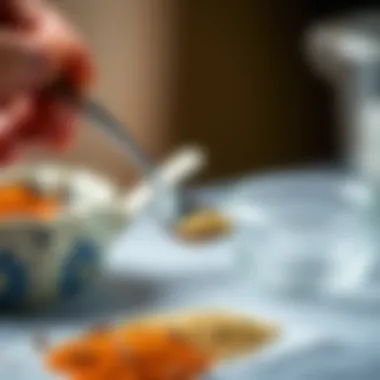
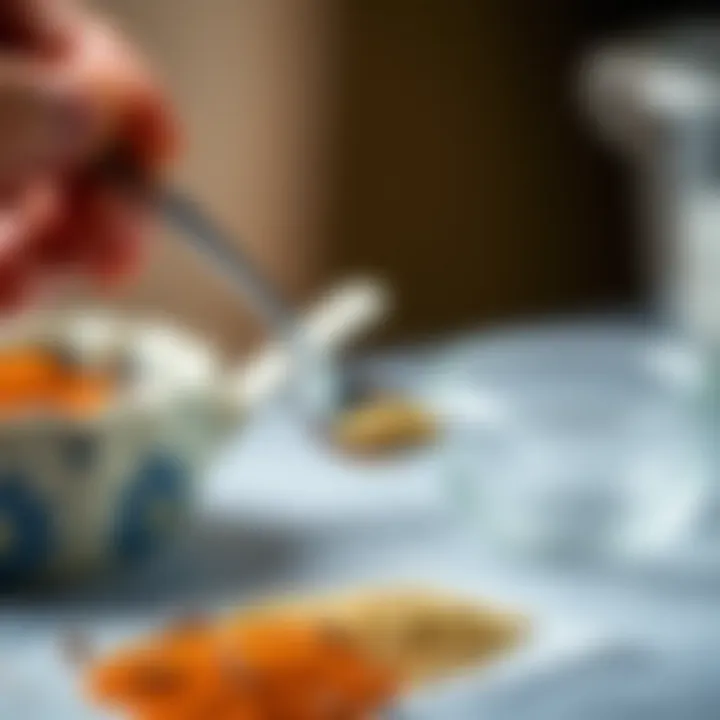
- Appetizers: Spoons can be utilized for serving small bites to diners, adding to an upscale feel.
- Desserts: Perfect for scooping sauces, creams, or sorbets.
- Condiments: Use for serving various condiments that complement the main dish, keeping the table tidy.
"Using small spoons for serving emphasizes the importance of presentation. A well-placed garnish or sauce can elevate the entire meal experience."
Adopting small spoons in cooking and serving processes not only enhances accuracy but also reflects the art of culinary presentation. Together, these functions of measuring and serving highlight the importance of small spoons, cementing their place as indispensable tools in our kitchens.
Cultural Significance of Small Spoons
Small spoons, often overlooked among kitchen tools, hold deeper meaning in various culinary practices and traditions. They are not just practical utensils but are imbued with cultural significance that varies between regions and households. By understanding this cultural backdrop, we gain insights into human connection through food and the rituals surrounding it.
Culinary Traditions Around the World
In countless cultures, small spoons serve as indicators of culinary identity. For instance, in Japan, the small wooden spoons often accompany sushi, used not just for serving, but also as a show of respect toward the ingredients. Similar traditions can be found in Indian households, where small spoons are essential for serving spices during elaborate meals. They reflect the attention to detail that is celebrated in Indian cuisine.
"Food is not just sustenance. It’s the heart of the home, and small spoons are its keepers."
In African cultures, small spoons are used to share communal dishes, emphasizing community and togetherness during meals. A single dish, passed around with small spoons, transforms an ordinary meal into a shared experience. This communal aspect fosters bonding and showcases the rich variety of flavors within the cuisine.
Symbolism in Various Cultures
Beyond their practical uses, small spoons also symbolize wealth, status, and warmth in different cultures. In some European societies, a silver spoon is often associated with nobility, a reminder that wealth can be measured—even in utensils. In contrast, handmade ceramics in Latin America tell tales of artisanal craftsmanship, where the spoon itself becomes a work of art, reflecting the soul of the community.
Additionally, in many indigenous cultures, small spoons are seen as sacred objects. They are often made from locally-sourced materials, representing a harmonious relationship with nature. Culinary rituals may involve blessing these spoons, making them more than just tools but rather vessels of tradition, carrying the stories of generations past.
Exploring the cultural significance of small spoons provides valuable insights into how different societies cherish connection and respect the craft of cooking. Each spoon tells a story, adding layers to our culinary experiences and reminding us of the art that goes beyond the plate.
The Aesthetic Appeal of Small Spoons
The visual charm of small spoons cannot be overstated, especially when it comes to enhancing the dining experience. These little utensils do more than serve spices; they become part of the table's decor, adding character and warmth to the setting. When thoughtfully chosen, small spoons can reflect a homeowner's style, contributing significantly to the theme of a meal. Their colors, materials, and designs can be harmonized with tablecloths, plates, and bouquets to create a cohesive aesthetic.
Incorporating Small Spoons in Table Settings
In dining scenarios—whether casual or formal—small spoons often play a pivotal role. They are essential not merely for functional use but also for visual appeal. When set out elegantly, these miniature instruments add a sense of sophistication across the dining table.
Consider placing small, beautifully crafted spoons beside spice bowls during a meal. Such choices not only enhance the palate but elevate the overall look of the meal.
"The proper accessory can transform an everyday dining experience into a work of art."
Decorative Functions
Small spoons can serve various decorative functions, such as creating seasonal themes and catering to event-specific needs. Their versatility allows them to blend seamlessly into different styles, from rustic and vintage to modern and sleek.
Seasonal Themes
Seasonal themes are a delightful way to incorporate small spoons into your decor. For instance, during the winter holidays, you might use spoons made of shiny, polished stainless steel next to festive spice mixes. These small touches can invoke a sense of joy and celebration. The contrast between cold metals and warm spices can create a visual story that is both inviting and seasonal.
One of the key characteristics of seasonal themes is their ability to easily adapt to changing times without losing aesthetic value. Using small spoons that change color or design with the seasons is a popular approach, offering a fresh look throughout the year. This not only adds a personal touch but also conveys a sense of thoughtfulness to your guests.
Event-Specific Use
Event-specific use of small spoons can also be intriguing and advantageous. For instance, at a wedding, small spoons can be personalized with the couple's initials engraved, serving as both functional tools for sugar or salt and memorable keepsakes for guests. This unique feature allows the spoons to act as a centerpiece in their own right, sparking conversation and admiration.
Highlighting such personalized options makes event-specific usages a popular choice among planners and homeowners alike. They not only serve their intended practical purposes but also leave lasting impressions on guests, adding to the allure of the gathering.
In summation, the aesthetic appeal of small spoons goes beyond simple practicality. They serve as crucial elements in elevating table settings and contributing to the overall experience of dining, making thoughtful selection and design integral to successful culinary arts.


The Influence of Small Spoons on Cooking
The role of small spoons in cooking extends beyond simple practicality; they embody precision and flavor enhancement that can turn an average dish into a culinary masterpiece. These tiny tools are pivotal for both novice chefs and seasoned gourmets. With their ability to measure spices accurately and serve as a vessel for flavors, they can make the difference between a recipe that dazzles and one that falls flat.
Precision in Culinary Techniques
When it comes to culinary arts, precision is key. Small spoons are designed to provide exact measurements, ensuring that each ingredient finds its place in a dish. Consider the difference between a pinch and a precise teaspoon of paprika. The first may leave a dish bland, while the latter can elevate the flavor significantly.
Using small spoons helps chefs avoid the 'eyeballing' method, which can lead to inconsistent results. Accurate measurements invite consistency, making recipes reproducible. This is particularly important in baking where the chemical reactions rely on the precise ratio of ingredients.
Additionally, these spoons play a vital role in the timing of the cooking process by helping to time how long spices cook or marinate with other ingredients. For instance, starting with too much cumin can overwhelm a dish, while a perfectly measured amount can accentuate an earthy depth that lingers on the palate. In this sense, small spoons are not merely tools but instruments contributing to the harmony of a recipe.
Impact on Flavor Profiles
The influence of small spoons transcends technicality; they are essential to the flavor profile. Adding just the right amount of each spice can transform the taste, kicking a meal from mundane to extraordinary. For example, when preparing a rich Thai curry, a careful measure of lemongrass or galangal can dictate the dish's overall character.
With spices, balance is vital. Too much cayenne can turn a delightful dish into a fiery dish that may burn the tongue while too little will leave it tasting flat. With small spoons, chefs can craft nuanced layers of flavor, working in harmony rather than chaos.
Smaller spoons allow for the layering of flavors. As culinary professionals understand, it's about building taste. A dash of this here, a sprinkle of that there, rather than pouring freely. Each small spoonful thus becomes a carefully curated note in the symphony of the dish.
"The effectiveness of small spoons lies not just in what they hold but how they enable cooks to orchestrate flavors with finesse."
Buying Considerations for Small Spoons
When it comes to selecting the right small spoons for spices, a little forethought can go a long way. These humble utensils often serve as unsung heroes in our kitchens, yet their selection matters immensely. Choosing the correct small spoon not only aids in precise measurements but also enhances the overall culinary experience. We’ll delve into two critical aspects to consider: the balance between quality and cost, and eco-friendly options that may come into play.
Quality vs. Cost
Navigating the landscape of small spoons leads to a fundamental question: Is it worth it to spend a bit more for higher quality? The answer largely depends on how you intend to use these spoons. A well-made spoon can make all the difference, offering durability and functionality that cheaper alternatives might lack.
- Material Matters: Spoons crafted from sturdy materials, like stainless steel or high-grade ceramics, tend to withstand frequent use without warping or bending. Wooden spoons, while charming, may eventually need replacing if not maintained properly.
- Design Considerations: While some might think all spoons look alike, the ergonomic design of a quality spoon can change the game during cooking. A spoon that feels comfortable in your hand can reduce fatigue and improve accuracy when measuring spices.
- Investment in Longevity: After all, a small spoon that lasts years is better than a handful of cheap spoons that have to be replaced every few months. Think about the long-term vs. short-term costs when shopping around.
Finding good quality doesn't always mean breaking the bank. Sometimes local artisan shops or even vintage markets offer hidden gems that marry quality craftsmanship with reasonable prices. Online platforms like Amazon or specialty kitchen stores may also provide sales where high-quality small spoons shine at discounted rates.
Eco-Friendly Options
In recent years, the push for sustainability has become increasingly important in our daily purchasing decisions. It is not just about avoiding plastic culprits but also embracing materials that tread lightly on our planet. As you consider small spoons, think about how your choice aligns with eco-friendly practices.
- Sustainable Woods: Opt for small spoons made from responsibly sourced woods. Bamboo is a popular choice, as it grows quickly and is remarkably durable.
- Recycled or Upcycled Materials: Look for spoons crafted from recycled stainless steel or sustainably sourced ceramic options. These not only reduce waste but can also add a unique touch to your culinary collection.
- Biodegradable Plastics: If plastic is your choice for certain tasks, consider spoons made from biodegradable substances. These options break down more gracefully in the environment compared to traditional plastics.
By incorporating eco-friendly spoons into your kitchen, you’re not just enhancing your culinary experience; you’re also contributing to a more sustainable future. It’s worth exploring your local stores or farmers’ markets, as many now offer environmentally conscious kitchen tools that keep our planet in mind.
"Investing in quality and eco-friendly kitchen tools reflects not only personal preference but also a commitment to better culinary practices and sustainability."
Care and Maintenance of Small Spoons
Caring for small spoons is often overlooked in the realm of culinary arts, yet it's an essential aspect that can prolong their life and maintain their utility. Properly maintained, these spoons not only look good but also perform better. This section delves into why attention to care and maintenance is crucial for the longevity and effectiveness of small spoons used for spices.
Cleaning Techniques by Material
Each material comes with its own set of cleaning needs, which can affect its durability and appearance. Here’s a breakdown of how to handle some common materials:
- Wooden Spoons: These spoons are not dishwasher safe. Rather, wash them by hand with mild soap and warm water. After washing, dry them immediately to avoid warping. Occasionally, applying a food-safe mineral oil can help keep the wood hydrated and resistant to cracking.
- Metal Spoons: Stainless steel spoons are relatively easy to clean. They can go in the dishwasher and withstand scrubbing without a hitch. However, for other metals like copper or aluminum, it's advisable to use gentle cleaning solutions to avoid discoloration.
- Plastic Spoons: Usually dishwasher safe, but be careful with high heat. High-quality plastic can stain from certain spices, so washing them immediately after use can help prevent this. A gentle scrub with baking soda can work wonders for tough stains.
- Silicone Spoons: These are quite forgiving. They can handle high heat and are stain-resistant. Just toss them in the dishwasher or clean them with soap and water. They can also be sanitized easily, which is a plus in any kitchen environment.
Keeping your small spoons clean isn't just for aesthetics—it's vital for food safety. Certain spices can leave residues that might mix poorly with your culinary creations if not cleaned properly.
Storage Solutions
Storing your small spoons properly can protect them from damage and wear. Here are some practical storage solutions to consider:
- Drawer Organizers: A simple yet effective way to keep spoons organized is to use drawer dividers. This method prevents them from clanging around and potentially scratching lovely finishes.
- Magnetic Strips: For metal spoons, attaching a magnetic strip on a kitchen wall or inside a cupboard can make for an attractive display while keeping them easily accessible. It’s a clever way to save space.
- Hanging Racks: Small spoon racks are not just functional; they can add a decorative element to your kitchen. Hang the spoons by their handles to avoid clutter and highlight their design.
- Containers or Jars: For aesthetic reasons, consider using small glass jars or containers to display your small spoons. This method not only keeps them organized but also showcases their beauty while keeping them within reach.
In investing time to care for and properly store small spoons, you are setting the stage for a more effective and enjoyable cooking experience. Decorative, functional, and well-maintained utensils elevate any kitchen, turning everyday cooking into a delight.



